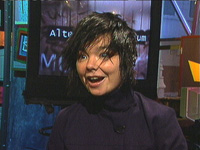



proudly presented
by GERM and thank you to all Fayenatics who helped.
Inspiration?Influence? or.....Plagiarism?�
Bjork, The Cranberries and Cocteau Twins. All these names were connected to Faye in numerous news articles. FayeXpress hereby introduces them to you.
BJORK


I always wonder why Faye was said to have copied Bjork's everything. To my knowledge, Faye has not even had one cover version of Bjork's song. Their voice, singing style and music style are all very different. The only time that suggests they look similar was Faye's "Pineapple-hairstyle look", which has been used over and over again in articles as "evidence" that she copied Bjork. But during that time, isn't the hairstyle, the makeup, and the "fake tears" just something�in the trend and were seen all over fashion mags as well?
Perhaps this false perception is caused by Faye admitting that she is a fan of Bjork and admires her talents.
Anyway, here is a brief background of Bjork:-
written by Glen Sansone
Her name sounds almost as quirky and eccentric as the music this Icelandic-born singer has been making since her early days with the artsy pop/rock group the Sugarcubes in the late '80s. Bjork has thrived since splitting from the 'Cubes in 1992, and she has released two solo records, Debut and Post, which have earned Bjork and her brave, beautifully-layered music a world of critical praise. CMJ New Music Report said its "exquisite, futuristic, dance-pop, big band swing and a myriad of indefinable variations in between" made it one of 1995's "most charming and sophisticated pop records, further establishing Bjork as a truly unique voice and personality in modern pop music." Bjork's new offering, Telegram, sees her, in a sense, covering herself. The album is a collection of Bjork's newly-conceived ideas for many of Post's songs, offering drastic, but no less brilliant, new versions with production assistance by such names as Graham Massey, Eumir Deodato, Mark Bell, and special guests including the Brodsky Quartet on "Hyperballad." The first single from Telegram is "I Miss You," and features rapping by London Posse's Rodney P.
for links to Bjork sites, go to Faye Links
COCTEAU�TWINS

Faye has already had seven released songs that were written by the Cocteau Twins (CT). Some were even specifically written for Faye by the group because CT and Faye once belonged to sister record companies ( Cinepoly and Polygram). Tracing back to 1993, Dou Wei (Faye's husband)�had revealed in an interview that he liked CT very much, and he would mostly listen to CT's album during that time.
Surprise, surprise - that was also the time when Faye's album started to include Cocteau Twins' music.
As written in this article, Faye might be one of the people who owe their inspiration to the Cocteaus:
Written by Michael C. Borum
You don't have to love the Cocteau Twins in order to appreciate their contribution to and impact on independent music over the last 14 years, but it helps. Many a journalist and more than a few more famous personalities (Madonna, Michael Jackson, Prince, Annie Lenox, Robert Plant...) have expressed their exasperation over the Cocteaus' unique and often overwhelming sounds. The volume of Cocteau Twins-related traffic on the Internet alone is testament to how profoundly effective their music has been. Nevertheless, you'd be hard-pressed to find the average individual who'd know what the hell you were talking about if you started discussing ark-larks, itchy glowbo-blows, fifty-fifty clowns, and calfskin-smacks.
But many hundreds of thousands of people all over the world would know what you were talking about. Not only that, there are more than a few bands who owe their inspiration to the Cocteaus, as well. In spite of this, though, the Cocteau Twins continue to be among the more obscure and yet quite successful (not to mention respected) artists around. Until recently, fairly little was known about them or their long history, and the typical fan has always had more than a handful of questions. Much of this can be attributed to circumstance and the band's punk roots. A staple of the revered and oft-enigmatic record label 4AD for nine years, the band developed an innaccurate reputation for being aloof and pristine (trust me, they're neither), and 4AD did little in the way of promoting them. They rarely gave interviews, and those they gave were vague and often uninformative; Music videos were few and far between, and live tours were focused mainly in the UK and Europe. At least one of the truths is that they weren't all that interested in the typical rock and roll fame and fortune, and their punk ideologies and individual instincts didn't click with the traditional ideas of success and wealth. Instead, they chose to keep a low profile -- keep their private lives private -- and reinvest the bulk of their earnings and energies back into their music, a practise which subsequently characterized them as one of the most prolific bands ever. Although some incorrectly assume their 1990 LP Heaven or Las Vegas to be their first album, they may be surprised to learn that, by that time, the Cocteau Twins had already released no less than seven albums and eight EPs (and have since released a 10-CD box-set, two LPs, two proper EPs, and at least 6 singles. Not to mention all the guest appearances and film soundtracks).
Misconceptions have been numerous, and rumours frequent. The Cocteau Twins' cult-like following had little beyond the music itself, and naturally wanted to know more. But interviews and articles -- which themselves were published few and far-between -- were sometimes as unrevealing and opaque as was the music. Bits of truth and good-humored misinformation often led to rumours, some of which persist to the present day. For years, questions like How many women are there in the band? (Just one), Are Robin and Liz a couple? (They used to be, but aren't any longer), In what language is she singing? (Usually just a sort of English, but often a random mixture of words from other languages and words she has made up herself), What do the band members look like? (Go to the Gallery and see for yourself!), Where did the name Cocteau Twins come from? (An old Simple Minds song...), etc. etc. were answered in every conceivable fashion, and once included the absurd idea that the band practised witchcraft! Everyone had their own story of what the Cocteaus were all about, and continue to have. And perhaps that was best; After all, the music often lends itself to individual interpretation anyway.
But today things are different. Very different. Since the release of Heaven or Las Vegas, the shroud of mystery has finally begun to lift, and everyone can plainly see that the Cocteau Twins are really no different from anyone else -- they just happen to make exceptionally unique music. The journey to where they are now has often been less than a fairy tale and they've managed to survive a number of personal and professional tribulations. Their deteriorated and unhealthy relationship with 4AD was severed in 1990, and they have since found a new home with Fontana Records in the UK, while maintaining their thus-far successful relationship with Capitol Records elsewhere. The last four years have brought on some serious personal challenges that would have torn apart most relationships for good. Lucky for the rest of the world, they're still here. And they're far from finished. Now parents and in their thirties, Robin, Liz and Simon are trying their best to live mature, responsible lives, explore their diverse musical tastes and talents, and enjoy themselves and their successes -- something they are now growing to accept and embrace. After all, they've earned it.
Which brings us to the topic at-hand. With the popularization of the Internet and the advent of the World Wide Web, the dissemination of information has become virtually instantaneous. The Cocteau Twins are among the many hundreds of other bands who are using this resource as a means of keeping in touch with their millions of fans and other interested parties. We felt it only natural that this would be the place to tell their story as best can be and try to set the record straight, as it were. The title, Treasure Hiding, is also the title of a song on the band's newest record, Milk and Kisses, and perhaps best describes the story behind the Cocteau Twins -- a sort of hidden treasure. The History is, perhaps fittingly, organized around their music. You may select any of the links at left to directly access a chapter. There are links provided throughout which will connect you to other parts of Treasure, including the Discography and a variety of photographs, song samples, video clips, and other related Internet sites.
One last note: Throughout this history, there are dozens of quotes of the band members which were recorded in some way or other by the press. People change, so some of the quotes should be taken with grains of salt. The copyright for this History is mine, except where noted, and its contents are subject to the approval of the band. I welcome your comments and feedback at [email protected].
for links to Cocteau Twins site, go to Faye Links
THE�CRANBERRIES
Faye's cover version of "Dreams" was a hit. It has even become the theme song of Wong Kar-Wai's movie, "Chung King Express". However, this is the only Cranberries song that appeared in Faye's albums.
If you have taken notice though, there was a period where Faye's singing style resembles that of The Cranberries lead singer, Delores O'Riordan.
Here is an article on the Cranberries . Delore's talked about their world and their music:
written by Jayne Margetts
So the story goes: it was a wet Friday night in downtown Dublin and in a cosy international bar on Wicklow Street nobody plays a blind bit of notice to The Cranberries or a n American producer named Bruce Fairbairn huddled together at a table who were soon to enter the intimate domain of a studio in Dublin to create their third album - a portrait of a world rocked by emotional turbulence and nylon guitar chords - to be title d To The Faithful Departed.
In other parts of the world, such a gathering would have brought the local music press scrambling through its doors, armed with notebooks and cameras. But in the battle-scarred nook of Dublin, people went about their bu siness, supping beer while a sense of calmness and down-to-earthness pervaded. Known for their spritely passion and love of music the occupants of the bar nodded towards the cosy quartet in respectful recognition and continued with their conversations.
Should The Cranberries' diminutive vocalist Delores O'Riordan, the fiery, volatile banshee and humanitarian Gaelic diva have taken the stage and let rip those bewitching, howling vocals that reverberated through the anguished Zombie or unleashed a s oothing and heartrending medieval ode to the spirit of her countrymen, no doubt she would have warmed the hearts and lit the eyes of the folk around her, and somehow that would probably have been as gratefully received as it would standing in some of the world's largest venues bathed in applause from 200,000 people high on The Cranberries bittersweet cacophonies.
For Ireland's sonic patron saints of the working class, and particularly The Cranberries drummer, the pensive Fergal Lawler, whose Gaeli c tones are filled with sobriety and retrospection, the insularity and low-key atmosphere of the inns of Dublin and its people helped him to deal with a notion that he is not yet ready to face: "It is a big thing to comprehend the fact that with No Need T o Argue we touched about 12 million people," he gasps. "It's silly trying to think about it too much because it's too freaky. It's scary to think about the fact that, that many people have listened to our music.
"Aside from that thought, I think t hat everyone is dealing with it quite well. We're all very down-to-earth people. I think with success everyone was kinda saying 'okay, don't lose the head', because it's so easy to go this way or that way," he gestures frenetically. "I think we had two ch oices and we could have gone either way, so everyone became more down-to-earth than would normally have happened. Everyone's focused on trying to be as normal as possible and the one thing that we promised ourselves from day one was that if it got to the stage where we got really big we all agreed we wouldn't lose our heads.
"We decided we would never go off on the sex, drugs and rock'n'roll kind of thing that so many bands have done before because at the end of the day your music suffers ..."
Sharing a similar kind of organic rawness and grassroots patriotism as fellow Celtic musicians Luka Bloom, Sinead O'Connor, Shane MacGowan and an Morrison, The Cranberries are icons of the working class spirit who remain true to who they are and wher e their roots lie. Throughout their autobiographical snapshots of alternate anger and vulnerability on Everybody Is Doing It So Why Can't We?, No Need To Argue and the soon-to-be-released To The Faithful Departed they mark the passing of time with their c austic, jangling and lilting odes of death, birth, innocence, loss, memories and bloodshed.
It's the sniff and stench of passionate people drowning theirsorrows at the bar, head in hands, seeking and searching for a solution to the world's problem s.
O'Riordan's lush and caustic howl soars through tributes that mourn at the loss of John Lennon in (I Just Shot) John Lennon and Kurt Cobain; rekindles memories of her grandfather sitting in an armchair beside the fire in the lillting shuffle of Joe ; condemns the futility of the war raging in Bosnia and the suffering of children in War Child; swoons between medieval vaudevillian strains of Will You Remember?; and contorts with rage at drug addiction and "all the people doin' lines ..." in Salvat ion..
From ethereal diva to a woman purging the contents of her very soul, O'Riordan waltzes, struts, howls, strums and mourns, while Fergal, Noel and Mike Hogan create shards and walls of jangling sparsity and pyromaniacy. This is The Cranberries at their rawest without the aid of a safety net or any polish. "It's not too produced or compressed or too anything. It's just there ... in your face. It's live and that's what we were looking for," Lawler agrees. "There were very few takes, very little editing, and there are rough edges on this album , but we wanted to leave them there.
"It sounds great and I really think it captured the spontaneity and almost a live feeling. It's really fresh compared to the other stuff we've done," he grins.
According to Lawler the genesis and conception of much of the lyrical observation on this album was catalysed by what they saw going on around them, even in the maternal haven of Limerick, home to all of the Cranberries except O'Riordan ("she is be tween Canada and Dublin at the moment, because her husband is Canadian"). Lawler concedes that even in such lush surroundings the drug problem has risen to new heights.
"The song Salvation is a glance at drug addiction," he muses with a forlorn lo ok in his eyes. "If you look around you see so much of it going on day-to-day, even in Limerick, which is quite a small town. You walk around the place and go to pubs at night and you see people drinking water because they're on ecstacy or whatever. It's quite scary to see that. I mean no matter how much you travel, and how much you see, nothing can prepare you for that kind of thing. You see your brother's friends who are 16-year-old and they're totally out of it. It's scary to see how it's taken over th e whole world.
"I dunno," he sighs, "you meet so many people who have been through all that and they look back and they say 'what's the point'?" He pauses suddenly, "People learn the hard way I suppose. It's just unfortunate that some people don't survive it."
Lawler almost throws his hands up in despair, while O'Riordan mirrors the same kind of reaction towards War Child and its origins. She explains "I love children and I received a letter from Brian Eno who asked me to design something for a War Child fashion show that didn't happen, but I was moved by Bosnia and that morning in my hotel room I wrote the song in about 10 minutes - children suffer most of all whether it's Bosnia or the Bogside. It's sick. They're so vulnerable," she conc ludes.
Synonymous with speaking her mind, O'Riordan inspires in Lawler and the rest of the band pure admiration for her honesty, courage and uncompromising stance when it comes to penning her thoughts. Lawler remembers the slip of a girl who first volunteered to replace their vocalist Niall Quinn back in 1989. "When she first started singing it was like 'this is it.' The four of us looked at each other and knew that this hadn't been done before," he remembers.
The year was 1990 and after a swift name change to The Cranberries and their first gig at Limerick's Rugby Club to an audience of 60 people, they released a cassette entitled Nothing Left At All which contained the beautifully lush Linger, Dreams and Put Me Down. Pressing 300 cassett e copies it took only a few days to sell out. The following year, they embarked on their first UK tour supporting Moose and a month later in July signed a contract with Island Records in the US after being courted by Virgin, EMI, CBS and Warners.
In October of the same year, The Cranberries released their debut EP Uncertain in the UK, arousing little attention and some disappointment from their critics. By December, they had began another UK tour headling a show at The Power Haus with Verve as sup port. Sadly, the band were due to support Nirvana in Belfast, but it never eventuated as Nirvana cancelled at the last moment.
March 1992 saw them hire a new manager who put them in touch with producer Stephen Street (The Smiths, Blur) and the ban d returned to Dublin to record their debut album. Later on that year they released their debut single Dreams which made it to No 75 on the UK charts. In January 1993 when they released Linger it hit No 74 and left them more determined than ever to succeed .
A tour followed in February with indie goddesses Belly and the subsequent release of their album Everybody Else Is Doing It, So Why Can't We?. Ironically, a year after its release the album re-entered the UK charts at No 1 and The Cranberries be came one of only five artists to ever achieve a re-entry at that position. To date, the album has sold five million copies worldwide and remained on the Billboard album charts for two years. It went double platinum in Australia.
Support slots with Mike Oldfield, a European tour with Hothouse Flowers, a US tour supporting Suede and a support slot for Duran Duran's Arena Tour suddenly cancelled when Simon Le Bon fell ill all followed. Due to their already spiralling popularity they stayed on and qui ckly arranged U.S. club dates.
1994 saw them re-release Linger and begin recording No Need To Argue with producer Stephen Street. By March, the band had been awarded the IRMA Award (Ireland) for Best New Irish Band and won the UK Music Week Awards Top New International Act. But it wasn't until the release of No Need To Argue, an album that sold over 12 million copies worldwide, went quadruple platinum in the U.S. and gold/platinum in 25 countries around the world, that The Cranberries were finally catapulted to world-wide fame and success.
For Lawler, though the slow burn that had preceded their success taught him a very valuable lesson. "When we started off we were very young. We were like 18-years-old and there was a lot of strange thing s written about us. We were naieve and four little Leprechauns from Ireland, y'know, that kinda thing, and it all felt strange, and we got a raw deal from the press mostly in the UK and Ireland. I mean, that happens to everyone really, and the fact that w e came through it ... it did us good in the end because we learnt to watch out for different things. It was an education," he asserts.
Today, it is impossible to forget the pained expression and vocal anguish that Dolores O'Riordan bled in the vid eo clip of Zombie; surrounded by children scarred by war in an urban war zone that ignited like a funeral pyre. And with To The Faithful Departed, The Cranberries continue to evoke visions of icons and memories of people who have left behind them a legacy that continues on long after their deaths.
O'Riordan concludes, "After listening through the full set of songs on this album it's not a sombre thing. I believe death is a good thing because you're going to a better place than where you are and th ere's lots of songs here about people who have left this earth but they've left good things behind them, like John Lennon and Kurt Cobain, and we learnt from them ..."
for links to The Cranberries' site, go to Faye Links
See also
TiTi Kwan's interview in Amoeba magazine. He talked about himself and
a bit on Faye.
[extra]
| [
attitude] | [
lyrics]�| [links]
| [style]�|
[Main ]